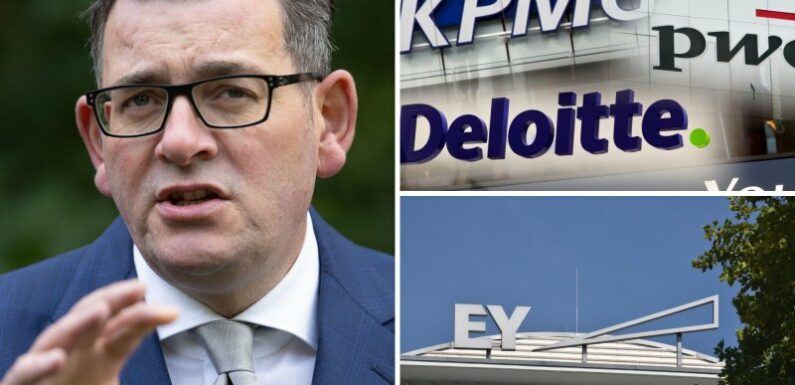
Spending on consultancies has rocketed 200 per cent since the Andrews government was elected, with government departments forking out almost $1 billion over eight years to a handful of private sector companies for advice, research and analysis.
The figures raise questions about a promise by the state government to pare back spending on consultancies – a pledge it repeated Wednesday – prompting warnings the state bureaucracy is rapidly losing its capacity to undertake its own work.
In the past financial year alone, 10 public sector entities handed over a total of almost $177 million – up from $59 million in 2014-15 when the government was elected.
The figures were complied by the Community and Public Sector Union and analyse the annual reports of nine departments and Victoria Police. They show that four big firms – KPMG, PricewaterhouseCoopers (PwC), Ernst & Young and Deloitte Touche Tohmatsu – collectively snared $73.5 million in government work in 2021-22, accounting for almost 42 cents out of every $1 spent on consultancies.
KPMG was the biggest winner, by a huge margin, raking in $31.9 million through 59 separate engagements in 2021-22. PwC snared 32 deals worth $15.3 million, while Ernst & Young earned $13.9 million and Deloitte $12.5 million.
CPSU Victorian secretary Karen Batt said the trend represented a secret government workforce that had been imposed on taxpayers at a premium price, warning it was an “obscene spend favouring the top end of town”.
She said it had become an in-joke in the bureaucracy that KPMG had been turned into an extra government department, while public servants faced wage caps and excessive work demands.
“Building their own in-house capabilities would be smarter, safer and for a fraction of the cost,” Batt said.
A spokeswoman for KPMG said the company was proud to assist the work of the Victorian Public Service, saying its expertise provided good value for taxpayers.
“With the pace and scale of change facing the community, the public sector often calls on specialist skills and capabilities from the private sector to complement the resources within the public service in delivering complex pieces of work,” she said. “This approach provides value for taxpayers and brings best practice expertise to the front line of public policy.”
Community and Public Sector Union secretary Karen Batt.Credit:Eddie Jim
A spokesman for Treasurer Tim Pallas said the use of consultants had increased during the pandemic as the government responded to an unprecedented global crisis.
“Now that the worst of the pandemic is behind us, we will reduce this spending – as we promised during the election campaign,” the spokesman said.
The government argues it needed to rely on consultants to provide specialist and technical support for crucial initiatives such as the COVID-19 response and Labor’s Big Build infrastructure agenda.
Immediately before the November 2022 state election, Labor promised it would save $50 million a year by cutting spending on consultants and labour hire from next financial year.
Victorian treasurer Tim Pallas has promised the government will cut back on the use of consultants.Credit:Nine
University of Melbourne school of government honorary senior fellow Marty Bortz said there was a growing awareness among senior bureaucrats and politicians that the public sector had become over-reliant on consultants, and that much of the corporate memory now resided with contractors.
But Bortz, who himself works part-time as a consultant, said it would take many years to restore the skills and expertise that had been lost.
“It’s a long-term project,” he said. “Part of it would be related to hiring practices, to the sort of the relationship between the universities and governments, creating a culture of looking at the public service as a profession, like a lawyer or engineer.”
The CPSU figures show that over eight years since Labor came to power, some $896 million has been spent on consultancies across the nine government departments and Victoria Police.
The biggest spender has been the Department of Transport, which last financial year handed over $37.7 million, including $7.9 million to Deloitte and $5.9 million to KPMG. The Department of Jobs, Precincts and Regions spent $36.3 million.
The spending surge follows a 2019 government edict banning departments from hiring consultants to “undertake work identified as a universal and enduring public service function”.
That, according to the government’s own guidelines, means no outsourced private sector work when it is “intrinsic to the running of the public service and delivery of government priorities”.
The NSW government has also faced questions about its use of consultants. A report by the Audit Office of NSW found the whole of the state government, including smaller government agencies, spent about $1 billion between 2017-18 and 2021-22. It said it was unlikely that state government agencies would meet a 2019 policy promise to cut consultancy expenses by 20 per cent each year between 2019-20 and 2023-24.
Federal Labor is also pushing to cut spending on consultants and labour hire companies by $3 billion a year as part of a plan being spruiked by Finance Minister Katy Gallagher aimed at “rebalancing and rebuilding” the internal capability of the federal public service.
The Morning Edition newsletter is our guide to the day’s most important and interesting stories, analysis and insights. Sign up here.
Most Viewed in Politics
From our partners
Source: Read Full Article

